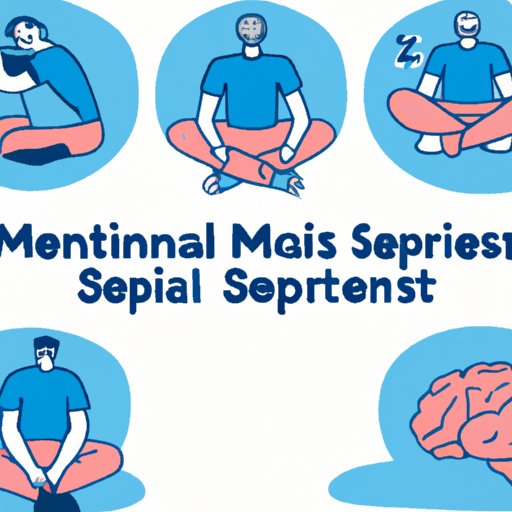Introduction
Mental health is an important part of overall health and wellbeing. It refers to the psychological, emotional, and social wellbeing of an individual. Mental health affects how people think, feel, and act in their day-to-day lives. According to the World Health Organization (WHO), “there is no health without mental health.”
Mental health issues can affect anyone, at any time. They can range from mild to serious and can have a significant impact on a person’s life. Mental health issues can include depression, anxiety, stress, bipolar disorder, eating disorders, and more. While there is no one-size-fits-all solution, there are steps that can be taken to take care of mental health.
Develop Healthy Coping Strategies
The first step in taking care of mental health is to develop healthy coping strategies. Coping strategies are techniques or behaviors used to manage difficult emotions and situations. They can help a person to better manage stress and challenging life events.
One way to develop healthy coping strategies is to identify triggers. A trigger is a stimulus that causes a person to experience a certain emotion or behavior. For example, a person may become anxious when they receive a text message from someone they don’t know. By identifying triggers, a person can learn to better manage their reactions to them.
Seeking support from others is another way to develop healthy coping strategies. Support can come from family and friends, as well as professionals such as therapists or counselors. Talking to someone who can provide guidance and understanding can be helpful in managing difficult emotions and situations.
In addition to seeking support, it can also be beneficial to learn stress management techniques. These can include deep breathing exercises, progressive muscle relaxation, and mindfulness meditation. Practicing these techniques can help to reduce stress and improve mental wellbeing.
Reach Out to Friends and Family
It is important to establish a strong support system of friends and family. Having a strong support system can help a person to cope with difficult emotions and stressful life events. It can also provide a sense of connection and belonging.
Talking about feelings and struggles can be beneficial for both the person talking and the person listening. Having someone to talk to can help to relieve stress and provide comfort. It can also provide an opportunity to gain insight into one’s own thoughts and feelings.
Participating in group activities is another way to reach out to friends and family. Group activities can provide a sense of community and connection. Examples of group activities include sports, clubs, classes, or social gatherings.
Exercise Regularly
Exercising regularly can be beneficial for both physical and mental health. Exercise releases endorphins, which are hormones that can help to improve mood and reduce stress. Exercise can also help to reduce symptoms of depression and anxiety.
There are many types of exercises to try. These can include aerobic exercises such as running or swimming, strength training exercises such as weightlifting, or low-impact exercises such as yoga or Pilates. It is important to find an exercise that is enjoyable and fits into one’s lifestyle.
How often to exercise depends on a person’s goals and abilities. The American Heart Association recommends at least 150 minutes of moderate-intensity aerobic activity per week, or 75 minutes of vigorous-intensity aerobic activity per week. It is important to listen to one’s body and not overdo it.
Practice Mindfulness
Mindfulness is the practice of being present in the moment. It involves paying attention to one’s thoughts and feelings without judgment. Mindfulness can help to reduce stress, improve focus, and increase self-awareness.
There are many ways to practice mindfulness. Some examples include mindful breathing, body scans, and gratitude journaling. It can also be helpful to set aside time each day to practice mindfulness. This can be done alone or in a group setting.
Seek Professional Help
If a person is struggling with their mental health, it is important to seek professional help. Mental health professionals can provide guidance and support to help a person manage their emotions and behavior.
There are signs of when to seek help. These can include feeling overwhelmed, having difficulty sleeping, feeling hopeless or helpless, withdrawing from activities, or experiencing changes in appetite or energy levels. If a person is experiencing any of these signs, it can be beneficial to seek professional help.
When seeking professional help, it is important to find the right type of professional. This can include a therapist, psychiatrist, psychologist, or social worker. It is also important to find a professional that is a good fit for the person’s needs.
Get Enough Sleep
Getting enough quality sleep is essential for both physical and mental health. Quality sleep helps to reduce stress, improve concentration, and boost mood. It can also help to improve memory and reduce the risk of depression and anxiety.
There are several tips for getting better quality sleep. These can include establishing a regular sleep schedule, avoiding screens before bedtime, limiting caffeine intake, and creating a comfortable sleep environment. It is also important to get enough hours of sleep, which is typically between 7 and 9 hours per night.
Conclusion
Mental health is an important aspect of overall health and wellbeing. Taking care of mental health can involve developing healthy coping strategies, reaching out to friends and family, exercising regularly, practicing mindfulness, seeking professional help, and getting enough sleep.
These tips can help a person to take better care of their mental health. It is important to remember to seek help if needed. With the right support and self-care, a person can improve their mental wellbeing and lead a healthier, happier life.
(Note: Is this article not meeting your expectations? Do you have knowledge or insights to share? Unlock new opportunities and expand your reach by joining our authors team. Click Registration to join us and share your expertise with our readers.)
